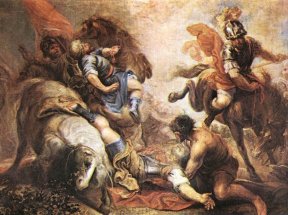
 UKE KNOWS HOW TO TELL A STORY in high drama. In Acts of the Apostles, chapter 7, he mentions that Saul is present at the stoning of Stephen, observing and consenting. In Acts, chapter 8, he tells us about Saul rounding up Christians for imprisonment. Then, in Acts, chapter 9, Saul is converted to Christ and starts preaching the Good News.
UKE KNOWS HOW TO TELL A STORY in high drama. In Acts of the Apostles, chapter 7, he mentions that Saul is present at the stoning of Stephen, observing and consenting. In Acts, chapter 8, he tells us about Saul rounding up Christians for imprisonment. Then, in Acts, chapter 9, Saul is converted to Christ and starts preaching the Good News.
This was an astonishing development. It would be like if Richard Dawkins—the avowed atheist who denounces God & religion at every chance—suddenly became a tele-evangelist, appearing on Sunday morning network programming. It was seemingly impossible.
The dramatic reversal was incomprehensible to the people of the time. Luke introduces into the story a man named Ananias, who was just one of the Christians in Damascus. The Lord appeared to Ananias and told him to go lay hands on Saul. Ananias fervently protests because of the impossibility of the matter: “Lord, I have heard from many sources about this man, what evil things he has done to your holy ones in Jerusalem” (Acts 9:13). In other words, “You couldn’t possibly want me to go near Saul. Everyone knows he is beyond help.”
Or was he? Given the life story of Saul, the notorious persecutor turned Christian, we have to concede that no one is beyond redemption. No one is beyond conversion. The truth of Christ, when spoken clearly and received humbly, is irresistible. Nothing will be impossible for God.
“Go out to all the world and tell the Good News” (Mark 16:15). We have nothing to lose, but many souls to gain for Christ.
